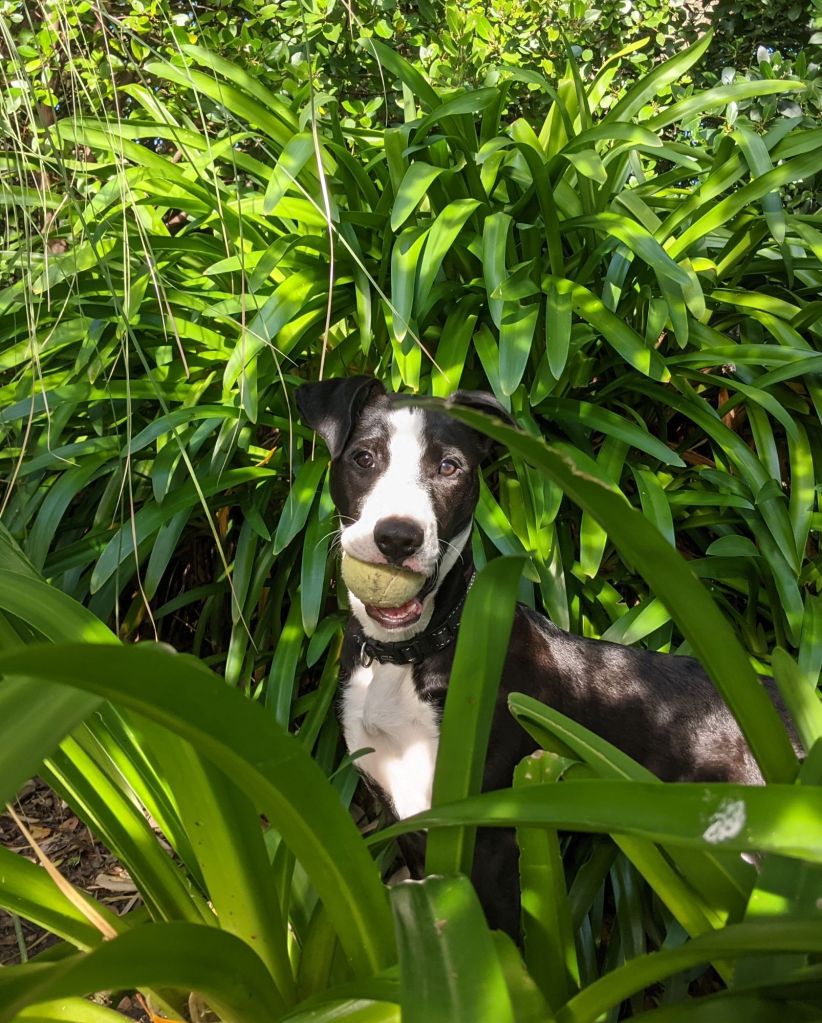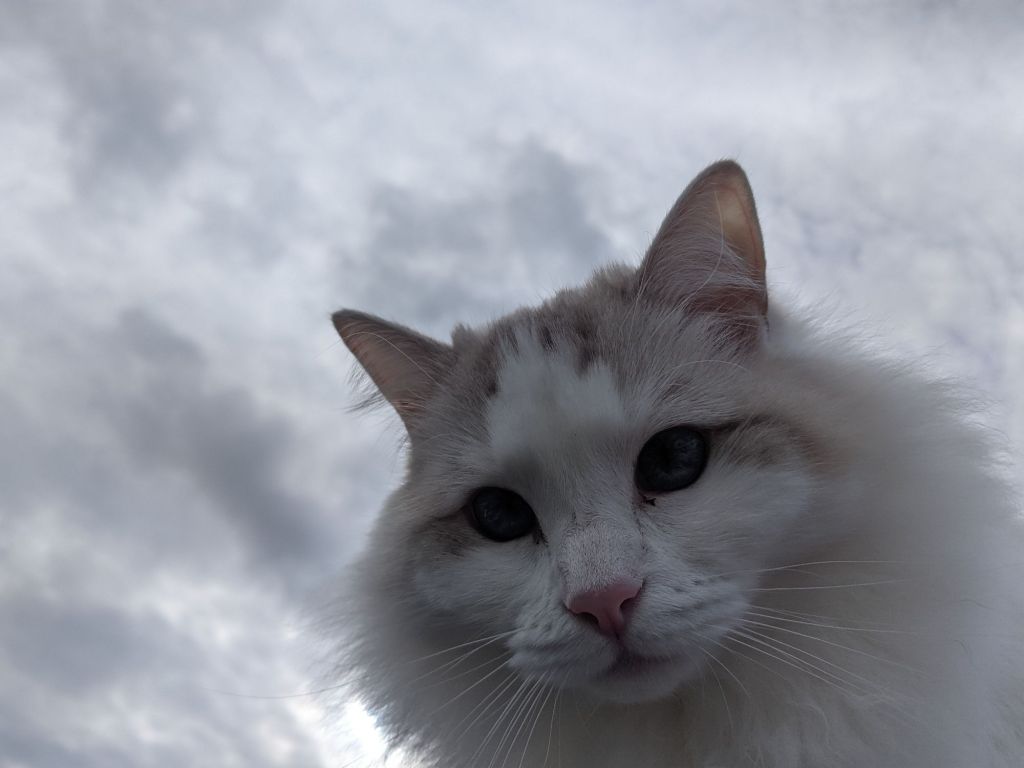Hi friend,
We have a dog.

Known as Pup-Pup, or Pupsicle. Came as Sisu but we didn’t like that name, and we’re only fostering her, so we don’t feel right giving her a more permanent name.
She’s lovely, especially now she’s mostly stopped pissing and shitting on the carpet. Being part whippet, she wants to chase and possibly maim our fluffy white cat, so our idle thoughts of adopting her ourselves fell away pretty quickly. There’s a strong bond already, though, because that’s how it is with dogs: they plead and plead with those soulful eyes for you to love them and think well of them until, finally, you do. Even the kids, who I thought would recoil instinctively from this boisterous five-month-old handful. And she is so good with them.
Are you sold yet? Do you have a fully fenced yard?? The cat will thank you:

*
Two months’ worth of books and movies this time. One book took me an entire month to read and spawned a half-formed short story. I’ve been making up for it since.
Still can’t get my head around much new music of 2024. Send recommendation?
BOOKS
The Books of Jacob
by Olga Tokarczuk, 2014 (translated by Jennifer Croft, 2021)
When Simon gives me our Lord’s request, a familiar vertigo settles upon me, like the illusion we all see when we close our eyes and rub them, a glittering aerial pan over the thick lines and circles of a monumental crystal labyrinth. It is sickening and altogether terrifying, but dazzling too, as if it contained untold riches, as if anything is possible, as our Lord insists it is.
“The Lord has heard the amassed pilgrims,” says Simon, “and demanded we raise funds to feed and clothe them.”
“How?”
“It doesn’t matter how. It’s His will, so it’s ours.”
Continue the story: Of a feast and a shadow.
Boy: Tales of Childhood
by Roald Dahl, 1984
I read this when I was about eight and on re-reading was quite taken aback at how strongly these tales influenced my construct of the world. The boy riding his bicycle with no hands; the crash and the detached nose; the chocolate parcels, the tuck box, the canings; the questioning of God; the bog seat warming; most of all, the list of favoured sweets in the sweet shop, which I ticked off from the recesses of my memory as I read the words back for the first time in thirty years. That shop is run by one of the book’s many awful women, demonstrating how Dahl’s blind spots were as noticeable in his prose as his eye for the right details, simply and memorably expressed.
Mophead
by Selina Tusitala Marsh, 2019
Cool. Love the sequence where she keeps getting told she should straighten her hair through an increasingly notable series of events. Nah bro.
The Wasp Factory
by Iain Banks, 1984
That’s one way to make your name. Probably the worst Banksie I’ve read, puerile in its fascination with torture and murder and genitalia. His talent for description is as strong here as anywhere, but thank God trans awareness has advanced far enough that even I can see the problems here, plain as day.
Nuclear War: A Scenario
by Annie Jacobsen, 2024
This book describes a terrifying end of the America-centric world as we know it, with passing acknowledgement of a band of hospitable Earth around the southern hemisphere (hello from down here!) and not a single mention of Africa. I question some of Jacobsen’s assumptions, particularly regarding the wild, ego-driven decision-making of certain world leaders. It hasn’t happened yet. But it’s hard to argue with the terrible consequences of nuclear weapons as she writes them here, or with the impossibility of designing well-functioning military and political systems around them. Anyway, nuclear disarmament now please.
When I open the shop
by romesh dissanayake, 2024
That thing where you’re allowed to experiment more in your first book. I really liked how dissanayake’s narrative never sits comfortably in any particular place or time or even form, instead building up a complex sense of immigrant existence in which achievement can’t completely banish unease — gotta just do the next thing, and the next, and the next. Great descriptions of food and cooking. Very detailed nods to Te Whanganui-a-Tara landmarks that will date the work in a hurry, including Le Moulin, the best bakery in the city.
Happy Campers (Ella & Olivia #8)
by Yvette Poshoglian (illustrated by Danielle McDonald), 2017
An early reader so neat, relatable and appealing that my bloody kids kept sounding out words even as I tried to read them the story. How long until they reject my increasingly desperate offers to read to them? They grow up so fast.
Slow Productivity: The Lost Art of Accomplishment Without Burnout
by Cal Newport, 2024
Sweet junk food to this burned-out contributor to the knowledge economy. Newport picks and chooses historical anecdotes to fit his narrative, which is untrustworthy enough even if they weren’t often half baked, but his practical advice on inbox and calendar management alone was worth it for me. And it’s hard to argue with the first two parts of his three-part formula: do fewer things, work at a natural pace, obsess over quality. Yes, he caveats the ‘obsess’ part.
Small Island
by Andrea Levy, 2004
Vivid and complex, clearly the work of someone who’d been working their way up to something this rich, and one of the best books I’ve read about race. There are four narrators, a chronological 1948 narrative and a series of flashbacks that break up and recontextualise where you’re up to in the ‘present day’ story. And it’s quite a story, or stories, because by the end you’ve walked alongside the four of them so far and wide and been through so much, because war is hell for everyone in some way or if another. The ending feels a little neat for such an ambitious book but maybe they all deserved it in the end. My first Andrea Levy and not my last.
MOVIES
FREE GUY
directed by Shawn Levy, 2021
The best video game world in a movie that I’ve seen, in that it is almost convincing as a video game AND riddled with exploits that in this case become central to the plot. It’s a sleight-of-hand that makes this movie seem dumber than the rest of the pack on the surface while actually engaging with the imperfections of programming and the industry’s morals (or lack thereof) in a meaningful way. I never really tire of Ryan Reynolds, who has mostly spent his career polishing the reputation of the shit-eating grin; how often have we rooted against him? (Some of you reading will say, “all the bloody time” — I know he’s not for everyone.) It’s a pity it all gets a bit Poochie near the end, and the romantic twist was not welcome.
NIMONA
directed by Troy Quane & Nick Bruno, 2023
Representation is reason enough for this film to exist, and I really enjoyed both the animation style and the voice acting of the two leads. It never feels like a feature, though, with a mostly telegraphed plot and a remarkable lack of balance in scene length. The production was a drawn-out nightmare so I should probably cut them some slack.
KUNG FU PANDA $ (er, I mean, 4)
directed by Mike Mitchell, 2024
My first movie in cinemas (that I remember, anyway) was HONEY, I SHRUNK THE KIDS. My children’s first movie in cinemas was KUNG FU PANDA 4. I would be happy to pass on some wisdom of my years on this Earth and say it’s all uphill from here, but a) I also saw DOOM (2005) in a cinema, and b) today they said they want to go and see KUNG FU PANDA 4 again. Is this the beginning of another Arceus Chronicles situation?
SHOWING UP
directed by Kelly Reichardt, 2022
Reichardt on the act of creation, warts and all. Anyone who has tried seriously to be creative, let alone produce art for public consumption, knows how dramatic, brutal and confusing the process often is, even in plain mid-shots of Michelle Williams frowning at clay. I read the entire film as a satire of penniless artists — their procrastination and their dumb dancing around in search of a purpose — until the final show, when we see exactly how good the main character’s art actually is. And she’s barely present with it because of her family, her job, her landlord (and rival), and her neuroses. Ultimately, what does it all matter? Well. The first thing is always to show up, then something might happen.
*
Final Thought: I watch a lot of video game playthroughs on YouTube (mostly DOOM, which has a very open-hearted open-source community still creating for it) and the algorithm suggests increasingly misogynistic and right-wing content for me. Sad!
Love b